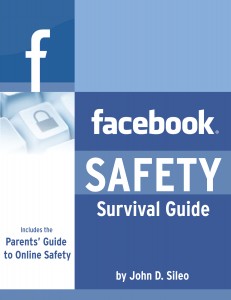Home | You searched for ""facebook privacy""
Latest Posts
Facebook has announced a new security feature that focuses on keeping users’ information safe from hackers attempting to gain access into your account.
The feature was announced last Thursday, and is similar to how secured banking sites work — they only let you access the site from approved computers. If you are attempting to log onto your Facebook account from an unknown computer, device, or location, Facebook will notify you via email and lock down your account in case it is under attack. To regain access, you will have to follow the link in the email which will lead you through a security check to verify your identity. They will ask you a few security questions and have you acknowledge that it was in fact YOU (or if it wasn’t you, then you notify Facebook at this point) trying to access your account.
Posted in Identity Theft Prevention, Online Privacy by Identity Theft Speaker John Sileo.
Tags: CNN, Facebook, identity theft expert, Information Control, John Sileo, Privacy, Social Networking Speaker
As of last week, Facebook has added two new ways that you can connect to things you care about. The problem with these changes is that they takes away the user’s ability to control who can see these connections. The first change made is the addition of Community Pages described by Facebook:
Community Pages are a new type of Facebook Page dedicated to a topic or experience that is owned collectively by the community connected to it. Just like official Pages for businesses, organizations, and public figures, Community Pages let you connect with others who share similar interests and experiences.
The addition of these new pages mean that certain parts of your profile, “including your current city, hometown, education and work, and likes and interests” will now be transformed into “connections,” meaning that they will be shared publicly. If you don’t want these parts of your profile to be made public, your only option is to delete them.
Posted in Identity Theft Prevention, Online Privacy by Identity Theft Speaker John Sileo.
Tags: Facebook, Facebook Changes, Facebook Expert, facebook privacy, John Sileo, Privacy, Privacy Facebook, safety, social networking
 Tareq and Michaele Salahi — Washington socialites are not just known for their possible roles in the upcoming “The Real Housewives of Washington,” but for being seen arriving at the White House State Dinner. The problem was that they weren’t on the guest list, but managed to work their way inside what is supposed to be the most secure party.
Tareq and Michaele Salahi — Washington socialites are not just known for their possible roles in the upcoming “The Real Housewives of Washington,” but for being seen arriving at the White House State Dinner. The problem was that they weren’t on the guest list, but managed to work their way inside what is supposed to be the most secure party.
The couple took to Facebook to document their party-crashing, and on Wednesday, Michaele Salahi’s Facebook page included photos of the couple at the dinner. The Salahis weren’t exposed until journalists caught sight of pictures showing the Salahis posing with President Barack Obama, Vice President Joe Biden and others. In the aftermath, the security breach looked more like a publicity stunt than a security threat. The Secret Service admitted that they did not verify at each checkpoint that this couple was on the invitation list. In other words, they missed the second cardinal rule of security, Verify.
Posted in Online Privacy by Identity Theft Speaker John Sileo.
Tags: Facebook, identity theft expert, Identity Theft Speaker, John Sileo, Online/Social Media Privacy, social engineering, social networking, White House, White House Party Crashers
In a New York Times Magazine article entitled Facebook Exodus, Virginia Heffernan questions whether Facebook users are losing interest like kids lose interest in a new toy. Heffernan cites the reasons her friends are defecting:
- It makes us too nosy, too focused on other people’s dirt (our “friends”)
- Some fear stalkers
- Some feel their privacy is being compromised
- Some disappear without a word
In addition to this, I would add:
- It takes a lot of time away from real-life interactions
- We remember why we weren’t in touch with those old friends from high school – they wouldn’t even talk to me then!
- People are tired of having more of a relationship with a screen than an actual human
- It encourages others to talk about you in an open forum, which is fine if everyone loves you
Posted in Identity Theft Prevention, Online Privacy by Identity Theft Speaker John Sileo.
Tags: facebook defection, facebook exodus, facebook privacy
Facebook safety has a direct correlation to your business’s bottom line.
Facebook, and social networking sites in general, are in an awkward stage between infancy and adulthood – mature in some ways, helpless in others. On the darker side of sites like Facebook, LinkedIn and Twitter, scammers and identity thieves are drooling at the sight of this unchecked data playground. In contrast, most social networkers are addicted to all of the friendships they are creating and renewing.
There is no denying that Facebook and other social networking sites have a very luring appeal. You can sit in the comfort of your own home and suddenly have a thriving social life. You can look up old friends, make new ones, build business relationships and create a profile for yourself that highlights only your talents and adventures while conveniently leaving out all your flaws and troubles. It is easy to see why Facebook has acquired over 200 million users worldwide in just over five years. Which is why Facebook safety is still so immature: Facebook’s interface and functionality has grown faster than security can keep up.
Unfortunately, most people dive head first into this world of social connectedness without thinking through the ramifications of all the personal information that is now traveling at warp speed through cyberspace. It’s like being served a delicious new drink at a party, one that you can’t possibly resist because it is so fun and tempting and EVERYONE is having one. The downside? Nobody is thinking about the information hangover that comes from over-indulgence: what you put on the Internet STAYS on the internet, forever. And sometimes it shows up on the front page of the Wall Street Journal, in the hands of a prospective employer or your boss’s inbox. All of the personal information that is being posted on profiles — names, birth dates, kids’ names, photographs, pet’s names (and other password reminders), addresses, opinions on your company, your friends and your enemies — all of it serves as a one-stop shop for identity thieves. It’s all right there in one neat little package and all a scammer has to do to access it is become your “friend”.
Follow these Five Facebook Safety Tips and save yourself the trouble…
5 Facebook Safety Tips
Facebook Safety Tip #1: If they’re not your friend, don’t pretend. Don’t accept friend requests unless you absolutely know who they are and that you would associate with them in person, just like real friends.
Facebook Safety Tip #2: Post only what you want made public. Be cautious about the personal information that you post on any social media site, as there is every chance in the world that it will spread beyond your original submission. It may be fun to think that an old flame can contact you, but now scammers and thieves are clambering to access that personal information as well.
Facebook Safety Tip #3: Manage your privacy settings. Sixty percent of social network users are unaware of their default privacy settings. Facebook actually does a good job of explaining how to lock your privacy down (even if they don’t set up your account with good privacy settings by default). To make it easy for you, follow these steps:
- Spend 10 minutes reading the Facebook Privacy Policy. This is an education in social networking privacy issues. Once you have read through a privacy policy, you will never view your private information in the same way. At the point the privacy policy is putting you to sleep, move on to Step 2.
- Visit the Facebook Privacy Help Page. This explains how to minimize all of the possible personal information leakage that you just read about in the privacy policy. Once you understand this on one social networking site, it becomes second nature on most of the others.
- Now it is time to customize your Facebook Privacy Settings so that only information you want shared, IS shared. This simple step will reduce your risk of identity theft dramatically.
Facebook Safety Tip #4: Keep Google Out. Unless you want all of your personal information indexed by Google and other search engines, restrict your profile so that it is not visible to these data-mining experts.
Facebook Safety Tip #5: Don’t unthinkingly respond to Friends in Distress. If you receive a post requesting money to help a friend out, do the smart thing and call them in person. Friend in Distress schemes are when a thief takes over someone else’s account and then makes a plea for financial help to all of your friends (who think that the post is coming from you). As with all matters of identity, verify the source.
Following these 5 Facebook Safety tips are a great way to prevent an information-sharing hangover.

The best way to protect you and your children from Online threats is to educate yourself about Facebook, Twitter, MySpace and other online social networking utilities. We recently published the Facebook Safety Survival Guide (with Parents’ Guide to Online Safety) with that exact goal in mind. Social networking is immensely powerful and is here for the long run, but we must learn to harness and control it.

John Sileo is the award-winning author of Stolen Lives, Privacy Means Profit and the Facebook Safety Survival Guide. His professional speaking clients include the Department of Defense, the FTC, FDIC, Pfizer, Prudential and hundreds of other organizations that care about their information privacy. Contact him directly on 800.258.8076.
Posted in Online Privacy by Identity Theft Speaker John Sileo.
Tags: Facebook, Facebook Safety, linkedin, Must Read, Online/Social Media Privacy, Privacy, social networking, twitter
According to the Christian Science Monitor and other reputable media sources, the marines have banned social networking sites, including Facebook and Twitter. Currently, the Pentagon is reviewing its entire policy on the use of social networking sites. Can you imagine the enemy discovering troop locations or military tactical data via social networking? Ironic timing, as just a few weeks ago I was delivering an identity theft speech at the Pentagon and recorded a short video about this problem.
Facebook Privacy & The Pentagon
The Christian Science Monitor ran the following quote from a memo distributed Tuesday to all Marines:
The very nature of [social networking sites] creates a larger attack and exploitation window, exposes unnecessary information to adversaries and provides an easy conduit for information leakage that puts [operational and communication security] personnel and the [Marine Corps network] at an elevated risk of compromise.
Posted in Identity Theft Prevention, Online Privacy, Video Tips by Identity Theft Speaker John Sileo.
Tags: facebook banned, Identity Theft Speaker, John Sileo, marines, social networking, social networking sites banned


 Tareq and Michaele Salahi — Washington socialites are not just known for their possible roles in the upcoming “The Real Housewives of Washington,” but for being seen arriving at the White House State Dinner. The problem was that they weren’t on the guest list, but managed to work their way inside what is supposed to be the
Tareq and Michaele Salahi — Washington socialites are not just known for their possible roles in the upcoming “The Real Housewives of Washington,” but for being seen arriving at the White House State Dinner. The problem was that they weren’t on the guest list, but managed to work their way inside what is supposed to be the 









